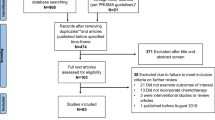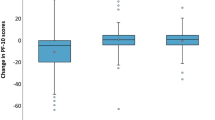Abstract
Purpose
Cancer patients who underwent chemotherapy experience cognitive decline, which, in turn, negatively impacts quality of life (QoL). Depression is considered a psychological factor that is negatively associated with the QoL of cancer patients. However, the relationships among cognitive functioning, depression, and QoL in breast cancer patients are under-researched in the literature. The aim of this cross-sectional study was to identify the role of depression in the relationship between cognitive functioning and QoL among breast cancer patients.
Methods
One hundred thirty breast cancer patients who underwent primary treatment participated. Participants completed the Functional Assessment of Cancer Therapy-Cognitive Function version 3, the Montreal Cognitive Assessment, the Beck Depression Inventory-II, and the Functional Assessment of Cancer Therapy-Breast Scale. The data were analyzed using multiple regression according to Baron and Kenny’s strategies and the Sobel test.
Results
Subjective and objective cognitive functioning and depression were statistically significant predictors of QoL in breast cancer patients. Depression played a partial mediating role in the relationship between objective cognitive functioning and QoL and between subjective cognitive functioning and QoL. Additionally, the Sobel test demonstrated that depression had a significant partial mediating effect between subjective cognitive functioning and QoL (Z = 4.91, p < 0.001) and between objective cognitive functioning and QoL (Z = 2.62, p = 0.009).
Conclusions
The findings indicated that depression could influence the association between cognitive functioning and QoL in breast cancer patients. Healthcare providers should develop an intervention focused on decreasing depression to evaluate the effectiveness of improving quality of life for breast cancer patients with cognitive dysfunction.

Similar content being viewed by others
References
Park EH, Min SY, Kim Z, Yoon CS, Jung KW, Nam SJ, Oh SJ, Lee S, Park BW, Lim W, Hur MH, Korean Breast Cancer Society (2017) Basic facts of breast cancer in Korea in 2014: the 10-year overall survival progress. J Breast Cancer 20(1):1–11. https://doi.org/10.4048/jbc.2017.20.1.1
Runowicz CD, Leach CR, Henry NL, Henry KS, Mackey HT, Cowens-Alvarado RL, Cannady RS, Pratt-Chapman ML, Edge SB, Jacobs LA, Hurria A, Marks LB, LaMonte SJ, Warner E, Lyman GH, Ganz PA (2016) American Cancer Society/American Society of Clinical Oncology Breast Cancer survivorship care guideline. J Clin Oncol 34(6):611–635. https://doi.org/10.1200/JCO.2015.64.3809
Hutchinson AD, Hosking JR, Kichenadasse G, Mattiske JK, Wilson C (2012) Objective and subjective cognitive impairment following chemotherapy for cancer: a systematic review. Cancer Treat Rev 38(7):926–934. https://doi.org/10.1016/j.ctrv.2012.05.002
Von AD, Habermann B, Carpenter JS et al (2013) Impact of perceived cognitive impairment in breast cancer survivors. Eur J Oncol Nurs 17(2):236–241. https://doi.org/10.1016/j.ejon.2012.06.002
Falleti MG, Sanfilippo A, Maruff P, Weih LA, Phillips KA (2005) The nature and severity of cognitive impairment associated with adjuvant chemotherapy in women with breast cancer: a meta-analysis of the current literature. Brain Cogn 59(1):60–70. https://doi.org/10.1016/j.bandc.2005.05.001
Janelsins MC, Kesler SR, Ahles TA, Morrow GR (2014) Prevalence, mechanisms, and management of cancer-related cognitive impairment. Int Rev Psychiatry 26(1):102–113. https://doi.org/10.3109/09540261.2013.864260
Stewart A, Bielajew C, Collins B, Parkinson M, Tomiak E (2006) A meta-analysis of the neuropsychological effects of adjuvant chemotherapy treatment in women treated for breast cancer. Clin Neuropsychol 20(1):76–89. https://doi.org/10.1080/138540491005875
Janelsins MC, Heckler CE, Peppone LJ, Kamen C, Mustian KM, Mohile SG, Magnuson A, Kleckner IR, Guido JJ, Young KL, Conlin AK, Weiselberg LR, Mitchell JW, Ambrosone CA, Ahles TA, Morrow GR (2017) Cognitive complaints in survivors of breast cancer after chemotherapy compared with age-matched controls: an analysis from a nationwide, multicenter, prospective longitudinal study. J Clin Oncol 35(5):506–514. https://doi.org/10.1200/JCO.2016.68.5826
Baxter MF, Dulworth AN, Smith TM (2011) Identification of mild cognitive impairments in cancer survivors. Occup Ther Health Care 25(1):26–37. https://doi.org/10.3109/07380577.2010.533251
Koppelmans V, Breteler MM, Boogerd W et al (2012) Neuropsychological performance in survivors of breast cancer more than 20 years after adjuvant chemotherapy. J Clin Oncol 30(10):1080–1086. https://doi.org/10.1200/jco.2011.37.0189
Myers JS, Wick JA, Klemp J (2015) Potential factors associated with perceived cognitive impairment in breast cancer survivors. Support Care Cancer 23(11):3219–3228. https://doi.org/10.1007/s00520-015-2708-7
Reich M, Lesur A, Perdrizet-Chevallier C (2008) Depression, quality of life and breast cancer: a review of the literature. Breast Cancer Res Treat 110(1):9–17. https://doi.org/10.1007/s10549-007-9706-5
Gonzalez-Fernandez S, Fernandez-Rodriguez C, Mota-Alonso MJ et al (2017) Emotional state and psychological flexibility in breast cancer survivors. Eur J Oncol Nurs 30:75–83. https://doi.org/10.1016/j.ejon.2017.08.006
Henneghan A, Stuifbergen A, Becker H, Kesler S, King E (2017) Modifiable correlates of perceived cognitive function in breast cancer survivors up to 10 years after chemotherapy completion. J Cancer Surviv 12(2):224–233. https://doi.org/10.1007/s11764-017-0661-9
Miura K, Ando S, Imai T (2016) The association of cognitive fatigue with menopause, depressive symptoms, and quality of life in ambulatory breast cancer patients. Breast Cancer 23(3):407–414. https://doi.org/10.1007/s12282-014-0578-3
Pendergrass JC, Targum SD, Harrison JE (2018) Cognitive impairment associated with cancer: a brief review. Innov Clin Neurosci 15(1–2):36–44. https://doi.org/10.1097/ncc.0000000000000578
Biglia N, Bounous VE, Malabaila A et al (2012) Objective and self-reported cognitive dysfunction in breast cancer women treated with chemotherapy: a prospective study. Eur J Cancer Care 21(4):485–492. https://doi.org/10.1111/j.1365-2354.2011.01320.x
Oh PJ, Kim JH (2016) Chemotherapy-related cognitive impairment and quality of life in people with colon cancer: the mediating effect of psychological distress. J Korean Acad Nurs 46(1):19–28. https://doi.org/10.4040/jkan.2016.46.1.19
Williams AM, Lindholm J, Siddiqui F, Ghanem TA, Chang SS (2017) Clinical assessment of cognitive function in patients with head and neck cancer: prevalence and correlates. Otolaryngol Head Neck Surg 157(5):808–815. https://doi.org/10.1177/0194599817709235
Akel R, El Darsa H, Anouti B et al (2017) Anxiety, depression and quality of life in breast cancer patients in the Levant. Asian Pac J Cancer Prev 18(10):2809–2816
Yeo W, Mo FK, Pang E et al (2018) Quality of life of young Chinese breast cancer patients after adjuvant chemotherapy. Cancer Manag Res 10:383–389. https://doi.org/10.2147/CMAR.S149983
Lee JY, Lee DW, Cho SJ et al (2008) Brief screening for mild cognitive impairment in elderly outpatient clinic: validation of the Korean version of the Montreal cognitive assessment. J Geriatr Psychiatry Neurol 21(2):104–110. https://doi.org/10.1177/0891988708316855
Wagner LI, Sweet J, Butt Z, Lai JS, Cella D (2009) Measuring patient self-reported cognitive function: development of the functional assessment of cancer therapy–cognitive function instrument. J Support Oncol 7:W32–W39
Nasreddine ZS, Phillips NA, Bédirian V et al (2005) The Montreal cognitive assessment, MoCA: a brief screening tool for mild cognitive impairment. J Am Geriatr Soc 53(4):695–699. https://doi.org/10.1111/j.1532-5415.2005.53221.x
Beck AT, Steer RA, Brown GK (1996) Manual for the Beck depression inventory–II, 2nd edn. Psychological Corporation, San Antonio
Beck AT, Steer RA, Ball R, Ranieri WF (1996) Comparison of Beck depression inventories -IA and -II in psychiatric outpatients. J Pers Assess 67(3):588–597. https://doi.org/10.1207/s15327752jpa6703_13
Brady MJ, Cella DF, Mo F, Bonomi AE, Tulsky DS, Lloyd SR, Deasy S, Cobleigh M, Shiomoto G (1997) Reliability and validity of the functional assessment of cancer therapy-breast quality-of-life instrument. J Clin Oncol 15(3):974–986. https://doi.org/10.1200/jco.1997.15.3.974
Baron RM, Kenny DA (1986) The moderator-mediator variable distinction in social psychological research: conceptual, strategic, and statistical considerations. J Pers Soc Psychol 51(6):1173–1182. https://doi.org/10.1037/0022-3514.51.6.1173
Preacher KJ, Leonardelli GJ (2008) Calculation for the Sobel test: An interactive calculation tool for mediation tests. IOP Publishing PhysicsWeb. http://quantpsy.org/sobel/sobel.htm. Accessed 20 May 2018
Andreotti C, Root JC, Ahles TA, McEwen BS, Compas BE (2015) Cancer, coping, and cognition: a model for the role of stress reactivity in cancer-related cognitive decline. Psychooncology 24(6):617–623. https://doi.org/10.1002/pon.3683
Acknowledgements
We would like to thank the study participants for their time and dedication to this study. We also thank the staff at the Breast Cancer Center, Ajou University Medical Center, Suwon, Republic of Korea, for their cooperation.
Funding
This study was supported by a grant from the Ajou University, College of Nursing.
Author information
Authors and Affiliations
Corresponding author
Ethics declarations
Conflict of interest
The authors declare that they have no conflict of interest.
Rights and permissions
About this article
Cite this article
Park, JH., Jung, Y.S., Jung, YM. et al. The role of depression in the relationship between cognitive decline and quality of life among breast cancer patients. Support Care Cancer 27, 2707–2714 (2019). https://doi.org/10.1007/s00520-018-4546-x
Received:
Accepted:
Published:
Issue Date:
DOI: https://doi.org/10.1007/s00520-018-4546-x




